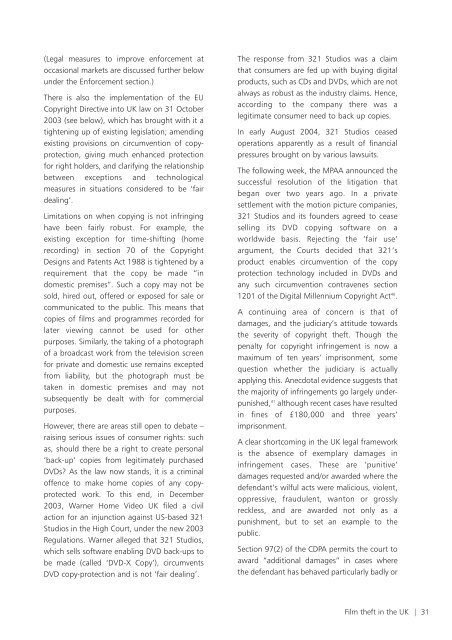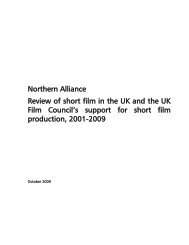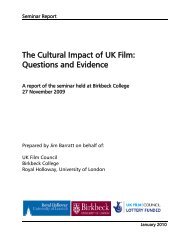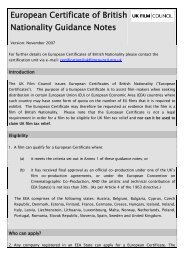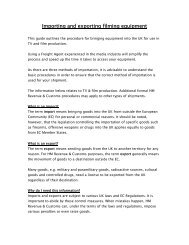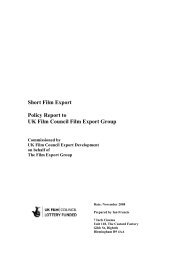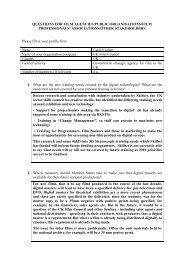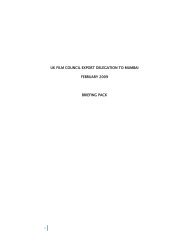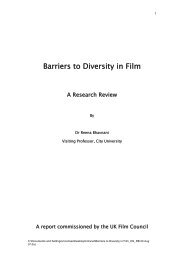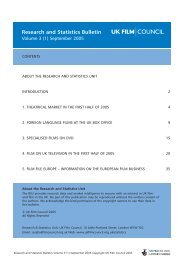Film theft in the UK - Future of Copyright
Film theft in the UK - Future of Copyright
Film theft in the UK - Future of Copyright
Create successful ePaper yourself
Turn your PDF publications into a flip-book with our unique Google optimized e-Paper software.
(Legal measures to improve enforcement at<br />
occasional markets are discussed fur<strong>the</strong>r below<br />
under <strong>the</strong> Enforcement section.)<br />
There is also <strong>the</strong> implementation <strong>of</strong> <strong>the</strong> EU<br />
<strong>Copyright</strong> Directive <strong>in</strong>to <strong>UK</strong> law on 31 October<br />
2003 (see below), which has brought with it a<br />
tighten<strong>in</strong>g up <strong>of</strong> exist<strong>in</strong>g legislation; amend<strong>in</strong>g<br />
exist<strong>in</strong>g provisions on circumvention <strong>of</strong> copyprotection,<br />
giv<strong>in</strong>g much enhanced protection<br />
for right holders, and clarify<strong>in</strong>g <strong>the</strong> relationship<br />
between exceptions and technological<br />
measures <strong>in</strong> situations considered to be ‘fair<br />
deal<strong>in</strong>g’.<br />
Limitations on when copy<strong>in</strong>g is not <strong>in</strong>fr<strong>in</strong>g<strong>in</strong>g<br />
have been fairly robust. For example, <strong>the</strong><br />
exist<strong>in</strong>g exception for time-shift<strong>in</strong>g (home<br />
record<strong>in</strong>g) <strong>in</strong> section 70 <strong>of</strong> <strong>the</strong> <strong>Copyright</strong><br />
Designs and Patents Act 1988 is tightened by a<br />
requirement that <strong>the</strong> copy be made “<strong>in</strong><br />
domestic premises”. Such a copy may not be<br />
sold, hired out, <strong>of</strong>fered or exposed for sale or<br />
communicated to <strong>the</strong> public. This means that<br />
copies <strong>of</strong> films and programmes recorded for<br />
later view<strong>in</strong>g cannot be used for o<strong>the</strong>r<br />
purposes. Similarly, <strong>the</strong> tak<strong>in</strong>g <strong>of</strong> a photograph<br />
<strong>of</strong> a broadcast work from <strong>the</strong> television screen<br />
for private and domestic use rema<strong>in</strong>s excepted<br />
from liability, but <strong>the</strong> photograph must be<br />
taken <strong>in</strong> domestic premises and may not<br />
subsequently be dealt with for commercial<br />
purposes.<br />
However, <strong>the</strong>re are areas still open to debate –<br />
rais<strong>in</strong>g serious issues <strong>of</strong> consumer rights: such<br />
as, should <strong>the</strong>re be a right to create personal<br />
‘back-up’ copies from legitimately purchased<br />
DVDs? As <strong>the</strong> law now stands, it is a crim<strong>in</strong>al<br />
<strong>of</strong>fence to make home copies <strong>of</strong> any copyprotected<br />
work. To this end, <strong>in</strong> December<br />
2003, Warner Home Video <strong>UK</strong> filed a civil<br />
action for an <strong>in</strong>junction aga<strong>in</strong>st US-based 321<br />
Studios <strong>in</strong> <strong>the</strong> High Court, under <strong>the</strong> new 2003<br />
Regulations. Warner alleged that 321 Studios,<br />
which sells s<strong>of</strong>tware enabl<strong>in</strong>g DVD back-ups to<br />
be made (called ‘DVD-X Copy’), circumvents<br />
DVD copy-protection and is not ‘fair deal<strong>in</strong>g’.<br />
The response from 321 Studios was a claim<br />
that consumers are fed up with buy<strong>in</strong>g digital<br />
products, such as CDs and DVDs, which are not<br />
always as robust as <strong>the</strong> <strong>in</strong>dustry claims. Hence,<br />
accord<strong>in</strong>g to <strong>the</strong> company <strong>the</strong>re was a<br />
legitimate consumer need to back up copies.<br />
In early August 2004, 321 Studios ceased<br />
operations apparently as a result <strong>of</strong> f<strong>in</strong>ancial<br />
pressures brought on by various lawsuits.<br />
The follow<strong>in</strong>g week, <strong>the</strong> MPAA announced <strong>the</strong><br />
successful resolution <strong>of</strong> <strong>the</strong> litigation that<br />
began over two years ago. In a private<br />
settlement with <strong>the</strong> motion picture companies,<br />
321 Studios and its founders agreed to cease<br />
sell<strong>in</strong>g its DVD copy<strong>in</strong>g s<strong>of</strong>tware on a<br />
worldwide basis. Reject<strong>in</strong>g <strong>the</strong> ‘fair use’<br />
argument, <strong>the</strong> Courts decided that 321’s<br />
product enables circumvention <strong>of</strong> <strong>the</strong> copy<br />
protection technology <strong>in</strong>cluded <strong>in</strong> DVDs and<br />
any such circumvention contravenes section<br />
1201 <strong>of</strong> <strong>the</strong> Digital Millennium <strong>Copyright</strong> Act 40 .<br />
A cont<strong>in</strong>u<strong>in</strong>g area <strong>of</strong> concern is that <strong>of</strong><br />
damages, and <strong>the</strong> judiciary’s attitude towards<br />
<strong>the</strong> severity <strong>of</strong> copyright <strong><strong>the</strong>ft</strong>. Though <strong>the</strong><br />
penalty for copyright <strong>in</strong>fr<strong>in</strong>gement is now a<br />
maximum <strong>of</strong> ten years’ imprisonment, some<br />
question whe<strong>the</strong>r <strong>the</strong> judiciary is actually<br />
apply<strong>in</strong>g this. Anecdotal evidence suggests that<br />
<strong>the</strong> majority <strong>of</strong> <strong>in</strong>fr<strong>in</strong>gements go largely underpunished,<br />
41 although recent cases have resulted<br />
<strong>in</strong> f<strong>in</strong>es <strong>of</strong> £180,000 and three years’<br />
imprisonment.<br />
A clear shortcom<strong>in</strong>g <strong>in</strong> <strong>the</strong> <strong>UK</strong> legal framework<br />
is <strong>the</strong> absence <strong>of</strong> exemplary damages <strong>in</strong><br />
<strong>in</strong>fr<strong>in</strong>gement cases. These are ‘punitive’<br />
damages requested and/or awarded where <strong>the</strong><br />
defendant’s wilful acts were malicious, violent,<br />
oppressive, fraudulent, wanton or grossly<br />
reckless, and are awarded not only as a<br />
punishment, but to set an example to <strong>the</strong><br />
public.<br />
Section 97(2) <strong>of</strong> <strong>the</strong> CDPA permits <strong>the</strong> court to<br />
award “additional damages” <strong>in</strong> cases where<br />
<strong>the</strong> defendant has behaved particularly badly or<br />
<strong>Film</strong> <strong><strong>the</strong>ft</strong> <strong>in</strong> <strong>the</strong> <strong>UK</strong> | 31


